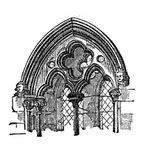Those “Lite” State Churches

Quo Vaditis: The State Churches of Northern Europe
By John Broadhurst
Publisher: Morehouse Publishing (P.O. Box 1321, Harrisburg, PA 17105)
Pages: 154
Price: $14.95
Review Author: William J. Tighe
Quo Vaditis (“Where are you going?”) is a book of essays dealing with the “subversion” from within of the Anglican and Lutheran State Churches of Britain and Scandinavia — notably, the Church of England, the Church of Norway, and the Church of Sweden. The editor, John Broadhurst, is Suffragan Bishop of Fulham in the Church of England’s London diocese, and a strong Anglo-Catholic traditionalist opponent of the ordination of women. Besides Broadhurst, who writes the introductory essay and the conclusion, the contributors, all apparently clergymen, include three Swedish Lutherans, two Norwegian Lutherans, three English Anglicans, and an American Episcopalian. The Anglican contributors all adhere to the theologically conservative Anglo-Catholic brand of churchmanship and the three Swedish Lutherans to the “high church” group which has formed the “free synod” within the Church of Sweden, while the particular theological stance of the two Norwegians is less apparent than their general Christian orthodoxy.
All of the essays deal with the pathologies currently besetting these State Churches. Among the essays I would single out three as being particularly illuminating. Roald Flemestad’s “Normlessness in the Church: The Church of Norway Succumbs to Postmodernism” focuses on the Norwegian Lutheran bishops’ wrestling with the issue of “same-sex cohabitation” and its implications for Christians. The “liberal minority” among the bishops (three out of eleven) wishes to accept these unions as tantamount to marriage by giving them Church approval and blessing, and denies that the Bible has any clear teaching on the subject that is not culturally conditioned by the prejudices of the times in which its writers lived (this group of three includes the Norwegian Church’s one female bishop). The remaining bishops, who form the “conservative majority,” Flemestad regards as fatally compromised by their desire to have it both ways: While they would reject having the Church bless such unions, and would refuse to ordain individuals living in them, they would be prepared to tolerate informal unions of this sort as acceptably Christian.
Dag Sandahl’s “Broken Promises — the Nordic Decline” vividly illustrates how the media, the school system, and the Church authorities (both bishops and bureaucrats) in Sweden continue to conduct an effective campaign of denigration and ostracism against clergy and laity opposed to the ordination of women in the Swedish State Church. Since the proportion of Swedish clergy opposing the ordination of women has remained stable at around 25 percent ever since the practice was first authorized under government pressure in 1958, and since the opposition is strongest among younger clergy and the more committed laity, the Swedish Lutheran bishops have recently resolved to deny ordination to all ministerial candidates who will not declare in advance their acceptance of women’s ordination and their willingness to co-operate in the fullest way with female clergy in the exercise of their ministry.
The most incisive essay of all, though, I found to be Geoffrey Kirk’s “The Language of ‘Lite’ Religion: Episcopacy and Apostolicity in Contemporary Anglicanism,” a passionate, witty, and serious essay (over which I fancied the impish ghost of Dom Gregory Dix must have been hovering) that exposes the theological vacuity of prominent episcopal advocates of the ordination of women in the General Synod debate in November 1992 and the absurd contortions they have subsequently executed in attempting to accommodate “two integrities” (i.e., the acceptance by some and rejection by others of the validity of the “orders” conferred on women) in the Church of England. The result, Kirk writes, is that, “There has come into being a ‘Lite’ episcopate — one which looks like, and on occasion acts like, a true episcopate, but which can no longer be that focus of unity and fount of authority which bishops exist to be.” In view of Pope Leo XIII’s Apostolicae Curae, Catholics can only agree, even if we would backdate the creation of the Anglican “Lite” episcopate to 1559.
For a Catholic, finally, the editor’s Introduction and Conclusion should prove interesting. In effect, they raise anew, although not explicitly enough, an important question. What authority can those Reformation churches which regard themselves as existing in some sense in historical continuity with the pre-Reformation Catholic Church in, for example, England, Norway, and Sweden, claim for themselves? That is, by what authority do they not only govern themselves but reach binding conclusions in favor of the ordination of women or homosexual relationships — conclusions without precedent in any form of “Catholic” Christianity and manifestly at odds with the clear teaching of Holy Scripture? The editor recognizes the critical nature of the questions even if he provides no compelling answers. His underdeveloped thoughts about the papacy evoke a similar response. He would appear to accord it a necessary place in that ecumenical yet orthodox Christianity toward which he foresees the “dissident groups” in the subverted State Churches as gravitating. What is far from clear to me, though, is whether his Lutheran contributors share this openness — and thus whether the increasingly close co-operation of theologically conservative Anglican and Lutheran groups will further the goal he desires or, alternatively, will subvert the “Catholic” aspects of Anglo-Catholic Anglicanism in favor of a Protestant “mere Christianity.”
You May Also Enjoy
Target Africa: Ideological Neocolonialism in the Twenty-First Century
Atheist Evangelization... Faking Motherhood... Biohacking... Ladies or Gentlemen... The Fickle Gender... Our Lady of the Lava Lamp... Don't Do the Hokey Cokey... The Obama Stimulous Package
The Latin Mass... The "Talking Heads" Mass... Sacralize the Vernacular Liturgy... The Final Insult... Are Catholics Cannibals? (Scene 1, Take 2)... The "Sheeple" in the Pews

